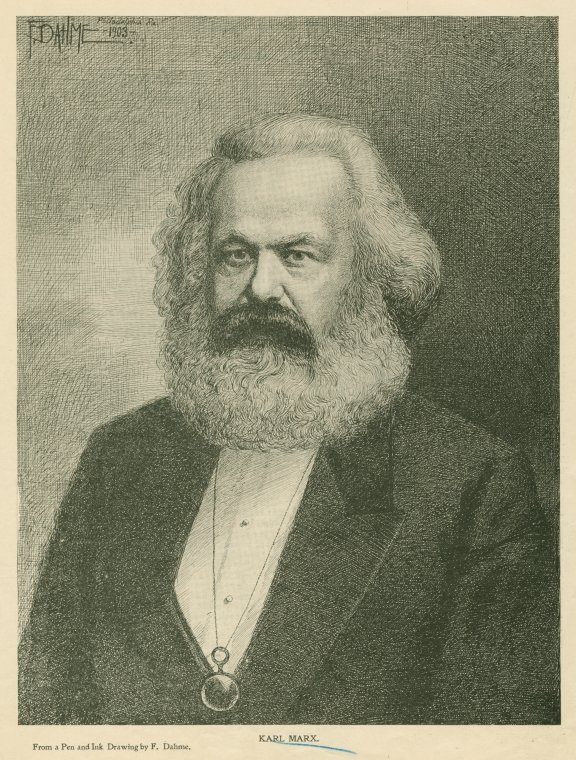Liberty Matters
Sharp Objects
 Marx has to be given credit for highlighting the "sharp objects" in the liberal project. We are imperfect human beings living in an imperfect world and stumbling upon various imperfect institutional solutions to our problems. Perfection and perfect harmony are not possible in this life.
Marx has to be given credit for highlighting the "sharp objects" in the liberal project. We are imperfect human beings living in an imperfect world and stumbling upon various imperfect institutional solutions to our problems. Perfection and perfect harmony are not possible in this life.Marx thought that the march of history inevitably would lead to socialism and that socialism could be the vehicle by which human societies could transition from the "Kingdom of Necessity" to the "Kingdom of Freedom." (Walicki 1995) This is, if not a beautiful picture, at least a bold one -- and in many ways a creatively bold one at that.
To fully understand Marx's system, one must not only look at the philosophical and methodological stance he takes, the analytical and empirical arguments he deploys, and the underlying eschatology he paints as a substitute for the religious doctrines of his time. To account for all of this in a deep sense is beyond our abilities in this discussion and in this format. But hopefully our conversation entices others to explore in greater depth Marx's system.
What I want to emphasize in this note is that social life for humans is full of "sharp objects." Some version of economics and libertarianism assumes these objects away through exercises in conceptual clarity. There are no monopolies, no externalities, no public-good problems, and no macroeconomic instability once we are conceptually clear about the relevant costs and benefits in decision-making and the appropriate property-rights arrangements. This is what Horwitz had in mind when he warned in his last comment of the "perfect market" fallacy. But Marx's vision of the future socialist world also eliminates the "sharp objects" through a transformation of the human being and the social relations of production. In the "Kingdom of Freedom," there is harmony as well as complete rationalization and unlimited material progress.
None of these is needed to develop a social morality for mortals. These "sharp objects" need to be recognized because if not, human societies will trip over them, fall on them, and they cut -- cut deeply -- and in many instances can fatally wound. So the object of our political and economic discourse should not be to brush aside concerns with poverty, ignorance, squalor, let alone concerns with power, coercion, and domination. No, we must embrace the challenge.
Remember, the key to political economy is to bear in mind that institutional problems demand institutional solutions. Humans are ingenious at creatively thinking about institutional fixes. There, genius is best on display at the local level, while human arrogance is best on display when people propose global fixes. But I don't want to belabor that point today. I want to instead just emphasize that the project of liberal political economy will advance not when we strive to eliminate the "sharp objects" in human existence but instead seek institutions that will dull the edges so rather than suffering deep cuts, human beings will suffer only scrapes and bruises in social intercourse. This is about the rules that enable us to live better together than we could ever live in isolation. It is these rules that enable us to realize the gains from social cooperation under the division of labor. It is these rules that encourage capital accumulation and unleash the innovation machinery of the entrepreneurial market economy.
Perfection is not an option for human beings — certainly not now and not in the future. We are imperfect human beings interacting in a most imperfect world, and we rely on imperfect institutions to enable us to find margins of cooperation rather than conflict and hopefully enough such margins so that we can live with one another in peace and prosperity.
Ultimately, this is Marx's biggest failure as a social thinker. He offers us little by way of a social morality for mortals. He helped sharpen our understanding of some "sharp objects" that we must account for in the bourgeois society, but he offers us little by way of analysis of how to creatively find ways to dull the edges and safeguard against deep cuts and fatal wounds. That project instead fell to Smith and Hume, to Say and Bastiat, to Mill and Marshall, to Mises, Hayek, Buchanan, and Ostrom.
Copyright and Fair Use Statement
“Liberty Matters” is the copyright of Liberty Fund, Inc. This material is put on line to further the educational goals of Liberty Fund, Inc. These essays and responses may be quoted and otherwise used under “fair use” provisions for educational and academic purposes. To reprint these essays in course booklets requires the prior permission of Liberty Fund, Inc. Please contact oll@libertyfund.org if you have any questions.